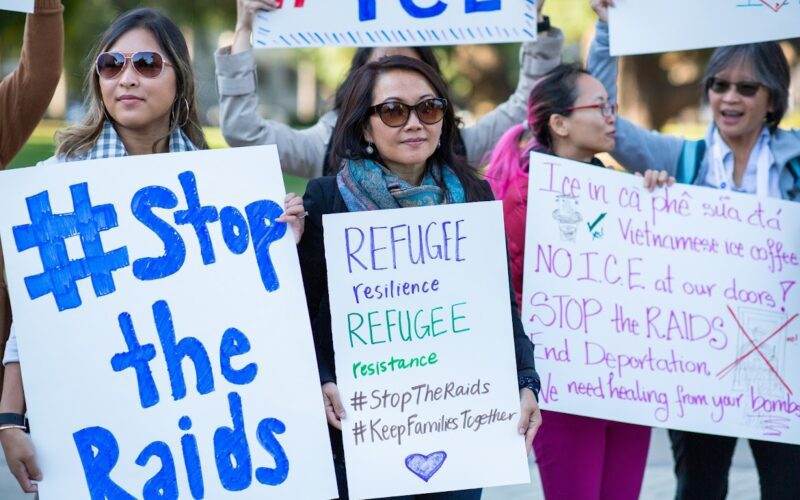Sign up here to receive The Yappie's weekly briefing on Asian American + Pacific Islander politics and support our work by making a donation.
After two years of work, a group of Southeast Asian advocacy organizations saw their efforts come to fruition on Sep. 20 when Rep. Alan Lowenthal (D-California) introduced the Southeast Asian Deportation Relief Act (SEADRA) in the House.
The legislation, campaigned for by the Southeast Asian Resource Action Center (SEARAC), Southeast Asian Freedom Network (SEAFN), and other community organizations, would ban the deportation of Cambodian, Vietnamese, and Laotian individuals who arrived in the U.S. before 2008. It’s the first such relief bill to include Cambodians.
SEADRA would also ban in-person check-ins with Immigration and Customs Enforcement (ICE) for individuals with removal orders and limit their frequency to once every five years. The period of work authorization would be extended from one to five years, alleviating the financial burden of application fees upwards of $410.
“This bill is an effort to try to center some of the Southeast Asian removal narratives and the Southeast Asian refugee narratives … [and] the need to make sure that immigrants and refugees who have a prior conviction and who have made mistakes are able to gain relief in the immigration system,” said Kham Moua, national policy director at SEARAC.
Since 1998, more than 17,000 Southeast Asian Americans have faced removal orders, and over 1,900 have been deported, according to data from SEARAC.
Many of these orders are a consequence of the 1996 Illegal Immigration Reform and Immigrant Responsibility Act, which gave the U.S. the authority to deport immigrants convicted of certain crimes without the chance to argue their case.
Short of other options, activists have worked to protect these immigrants by advocating for pardons. In 2021, California Gov. Gavin Newsom (D) pardoned Kao Saelee and Bounchan Keola after the Asian Law Caucus (ALC) and other community organizations campaigned on their behalf.
But these success stories are only a tiny fraction of the thousands of immigrants transferred to ICE detention each year.
For Southeast Asian immigrants, this often means facing the thought of survival in a country they had escaped as child refugees or had never even set foot on—even after completing their sentences in prison.
“We have accepted the consequences for our mistakes, and have finished the sentence we deserve. Deportation is not what we deserve,” Sophea Phea, a refugee who was deported to Cambodia in 2011 after serving a year in prison for a credit card fraud conviction, said at a press conference on Sep. 20.
Phea was only able to return to the U.S. in 2020 when Newsom pardoned her in response to advocacy by the Asian Law Caucus and other groups.
The new legislation in Congress “will end the cycles of trauma and despair of family separations within our community and give our people a sense of peace and relief,” she said.
In 2008, Vietnam and the United States signed a memorandum of understanding (MOU) that stopped the deportation of Vietnamese nationals who arrived in the U.S. before 1995.
In 2020, the Trump administration signed a new MOU that removed the protection. As a result, the number of removals to Vietnam, Cambodia, and Laos increased from 265 in the three-year period between 2015 and 18 to 541 in the period between 2018 and 2021, according to ICE reports.
“If a presidency like Trump’s happens again, we don't know how devastating that will be for our community. That’s why we wanted to have a more immediate bill while we continued to build the political power necessary to win [more comprehensive reform],” Nancy Nguyen, national campaign director of SEAFN’s Southeast Asian Relief and Responsibility platform, told The Yappie.
SEAFN started working on the bill in July 2021, according to Nguyen. Through the network’s partner organizations, including Freedom, Inc. in Wisconsin and VietLead in Philadelphia and New Jersey, SEAFN talked to impacted community members about the solutions they needed—like less frequent engagement with ICE.
“Every time folks check in [with ICE] it causes extreme duress or extreme stress because folks are not sure if they're gonna come out,” Nguyen said.
In January this year, SEAFN started working with SEARAC to draft legislation and find a congressional office to introduce the bill in January, Moua said.
Congressional Asian Pacific American Caucus chair Judy Chu (D-California), Congressional Progressive Caucus chair Pramila Jayapal (D-Washington), and 15 other members of Congress co-sponsored the bill along with Lowenthal.
“We are extremely fortunate that we have such strong congressional champions … that they were able to introduce this bill without any major concessions,” Moua said, pointing to Lowenthal, Jayapal, Chu, Rep. Zoe Lofgren (D-California), and Rep. Ayanna Pressley (D-Massachusetts).
Though all 18 original co-sponsors of the bill are Democrats, Southeast Asian immigration relief has seen bipartisan support in the past.
In May, Reps. Michelle Steel (R-California) and Brian Fitzpatrick (R-Pennsylvania) were among those who sponsored Lowenthal’s “Honor our Commitment” Act, which would prevent the deportation of Vietnamese nationals who arrived in the U.S. before 1995.
“There has been recognition across the aisle about the inadequate support that was provided to refugees,” Moua said. “The stories and the history of these populations in particular makes the issue compelling in a way that’s a little bit different from the general immigration narrative.”
The new relief act is part of SEAFN’s Southeast Asian Relief and Responsibility platform, a package of bills that aims to push the U.S. to take responsibility for the wartime damage it did in Vietnam, Cambodia, and Laos.
It also follows state and federal campaigns for stronger protections and greater reform surrounding immigration law.
“Our ultimate end goal is to actually restore lawful, permanent residence status” to formerly incarcerated refugees, Moua said. “SEADRA is a continuation of the conversation that [previous bills] started in addressing the need to humanely and compassionately deal with some of the harms that have happened because of the ’96 immigration laws.”
SEARAC has previously advocated for California’s VISION Act, which would protect Southeast Asian refugees by preventing state prisons from transferring inmates to ICE. The bill passed the state Assembly but failed to pass the state Senate by just three votes this August.
SEARAC is also part of a coalition that supports the New Way Forward Act, which would roll back parts of the Illegal Immigration Reform and Immigrant Responsibility Act by preventing automatic removal orders for immigrants with sentences shorter than five years. The bill was introduced in 2019 and again in 2021 by Rep. Jesus Garcia (D-Illinois), but has not yet seen a vote in Congress.
The hope “has always been that however and whatever we move in Congress it also builds people power around [these] bills,” Nguyen added.
The Yappie is your must-read briefing on AAPI power, politics, and influence, fiscally sponsored by the Asian American Journalists Association. Make a donation, subscribe, and follow us on Twitter (@theyappie). Send tips and feedback to [email protected].









